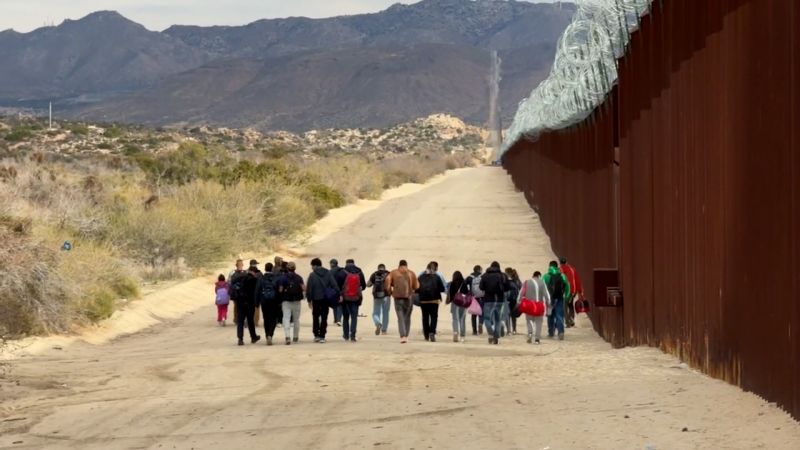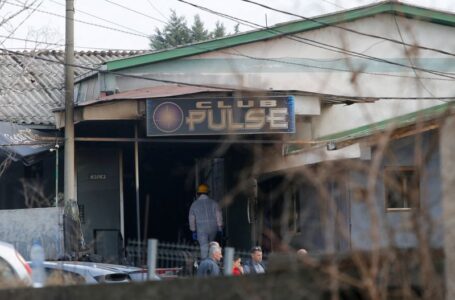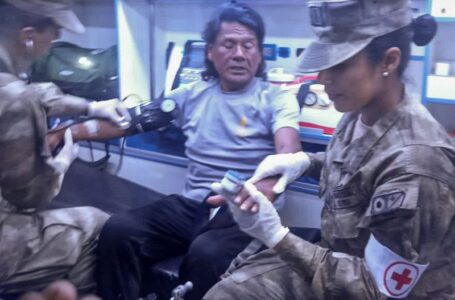Caught between China and the US, asylum seekers live in limbo in New York City


A simple act of walking into a mosque with his wife and two children in New York City is what made the past six months of struggle worth it for Ye Chengxiang – even if not everyone is celebrating his arrival.
“It’s only been over two months here, but we can feel the spirit of freedom, inclusiveness, and equality,” he said over a bowl of noodles. It was his only day off from working 12-hour shifts at a Chinese restaurant in New York City.
The slim former restaurant owner left China last October. The ruling Communist Party’s crackdown on his Hui Muslim ethnic group and growing restrictions on personal life gave his family no choice, he says. “When I was in China, I had a pent-up feeling in my heart,” he said of living as a Muslim in China, where his children were banned from entering a mosque.
Ye and his wife drained $40,000 of their life savings and illegally crossed the United States’ southern border in December after an exhausting weeks-long journey that saw the family take a hazardous boat journey from Colombia to the edge of the Darien Gap, a mountainous rainforest region that connects South and Central America. His anxieties melted away as Ye crossed into the US, which he described as entering a warm embrace. “I felt like I was home, and that feeling was very real,” he said.
Their destination was New York City’s Flushing neighborhood, home to a Chinese community going back generations. The city has integrated millions of migrants over the decades, and it continues to inspire newcomers like Ye – even as the arrival of such migrants has turned into a flashpoint in US politics ahead of the November elections.
After arriving in New York, Ye spent a week in a Manhattan shelter. Then, with the help of a group of other Chinese Muslim asylum seekers, he found a place to live and a job making noodles as his family proceeded through the religious asylum claim process. Their first court date is in October
On downtown Flushing’s Main Street, people hand out fliers offering help, for a fee, for the undocumented to secure drivers’ licenses. Alongside the street vendors hawking vegetables, undocumented migrants walk into buildings with employment agencies offering restaurant and sales jobs. This is what draws Chinese migrants toward enclaves like Flushing and Sunset Park, where immigrant networks, legal service centers, job markets and nonprofits form a vital support system.
For Chinese asylum seekers like Ye, there is a well-trodden route to residency in the US. Chinese nationals have the highest number of asylum claims granted in the US compared to other nationalities, because their “pathway to claiming political asylum [for Chinese nationals] is more codified,” said Amy Hsin, a sociology professor at Queens College in New York, who specializes in immigration and social inequality. The US expanded asylum pathways for Chinese citizens in the past due to geopolitical events and policies, like the 1989 Tiananmen Square massacre and the one-child policy, she explained.
Recently, growing restrictions on freedoms in China and its stuttering economy have led to this new influx of disillusioned Chinese citizens. More than 37,000 Chinese citizens were picked up by law enforcement crossing illegally from Mexico in 2023, US government data shows. That’s up from around 3,800 people the year before, and many of them were headed to New York City, according to experts.
“As a country under the rule of law, the Chinese government protects its people’s freedom of speech and freedom of religious belief in accordance with the law,” it also said.
‘America is better’
On the fourth floor of an old mall, migrant workers walk into a legal service center. They say they have lost their passports, or had them confiscated, in the melee of voluntarily turning themselves in for asylum with the Customs and Border Protection. The office, which helps them in their asylum applications, also connects them with the Chinese Embassy to apply for new travel documents.
The center’s owner, who declined to be named in this story because he does not have a license to practice law in the US, has helped more than 100 Chinese nationals since opening the office two years ago. The burden of proof for asylum claims in the US is high and the owner said many of his clients have struggled to provide concrete evidence of political and religious repression they faced in China. Many go on to protest against the Chinese government once in the US, freed from Chinese authorities and its censors, he said.
Dressed simply in jeans and a black jacket, Jiang Zhen said the sweeping crackdown on free speech, civil society and religion was suffocating him in China. He believes he was blacklisted for criticizing China’s government on social media sites, his accounts banned or suspended.
Poverty in rural China, like in his hometown in Hunan province, had become unbearable, with relatives and parents of friends “drinking pesticides, drowning themselves in rivers, or hanging themselves … especially when they are suffering from diseases like cancer and have no money for treatment,” he said, adding that the Chinese government ignores “the living conditions of the lower classes.”
As he waits for his work permit, which can take up to 18 months to approve, the 33-year-old now works illegally cleaning dishes at a Cantonese restaurant in Queens. He earns $4,000 a month, slightly more than what he earned as a business owner in the coastal Chinese province of Guangdong.
Next to him, a woman in a pearl-colored puffer jacket, who asked to remain anonymous because she works illegally in the country, said the US was not what she had imagined. She joked that China’s infrastructure bests what she has seen in New York. “From movies I watched when I was younger, I remembered Chinatowns being bustling and beautiful,” she said. “But after coming here, I found that Chinatown is in a state of disrepair. It’s broken and dirty. I was so surprised,” she said as the room burst out in laughter.
When asked why she has chosen to remain in the US, she replied: “Because the US is actually more powerful, despite sometimes the broken appearance,” she said. “I am not starving in China, but everyone wants a better life. Obviously, America is better.”
Anti-China measures
Both China and US authorities have been concerned with the uptick in migration to the southern border – but for entirely different reasons.
In the US, a record number of migrants at the southern border has been seized upon by Republicans who claim it as proof of the Biden administration’s impotence, pushing immigration control to a top election issue. While most migrants at the southern border hail from Latin American countries, some politicians have focused on Chinese migration as a security concern; Republican Rep. Mark Green of Tennessee, who chairs the House Homeland Security Committee, claimed last May that some Chinese migrants at the border had military experience, according to his blog, though he did not offer evidence.
Wan Yanhai, a human rights activist based in New York, said the implication that the Chinese asylum seekers could be soldiers or spies was “discriminatory.”
There would be little reason for the Chinese government to embed spies among southern border arrivals, he pointed out, considering migrants are not the demographic that would gain access to state secrets in the US. “These migrants in the US are doing low-level jobs and don’t speak the language, so they can’t do this kind of work. … It’s impossible for them to be spies.”
But the rhetoric around the rise of undocumented Chinese migrants highlights growing tensions between the US and Chinese governments. Geopolitical and security concerns have led an increasingly hawkish Biden administration to unravel years of technological and economic integration with its chief rival in the Pacific.
But Jiang, the asylum seeker who believes he was blacklisted by Beijing, is unfazed by the growing intergovernmental tensions. “It’s not really anti-China, it’s anti-Communist Party. I’m also against the Communist Party, I don’t have a good impression of them either, right?”
‘Deportation can’t stop me from embracing freedom’
Wan, a prominent former HIV activist in China, had to leave the country in 2010 due to harassment by Chinese authorities, he says. He received permanent US residence a year later and has gone on to help Chinese migrants in Flushing.
Many of the new arrivals head to the enclave’s unlicensed hostels, he said. He worries that rising hostel prices – upwards of $20 per night – could lead to a rise in homelessness, especially for the low-income elderly population in Flushing.
Li Jiada lives in one of those hostels, sharing a cramped room with five other men, sparsely decorated except for a calendar hanging above his single bed.
Life has not been easy for the 26-year-old, soft-spoken former fashion photographer since he arrived in the US on January 2023. He had spent three months in an Immigration and Customs Enforcement (ICE) detention center after failing an initial screening for asylum when he crossed the southern border. He was released this year pending deportation proceedings expected within the next year.
He initially struggled to find a job in New York. When he found one, he says, he was sexually harassed by a client and has since found a new role as a manicurist, earning $2,000 a month. His costs are higher than what he earns, but he says, “There’s no regret because coming here has given me more options.”
He is desperate to stay in the US and thinks Christianity, which he discovered while in detention, will save him from deportation. The Communist Party sees any large group outside its dominion as a threat, has banned the online sale of Bibles, and has arrested Christians for “inciting subversion of state power.”
“Maybe my only way forward is through Jesus,” he said. Li plans on filing a new asylum application based on his new-found religion.
Sitting in a Baptist church in Flushing, Li spoke about the stress of the looming deportation and thinks back about the first thing he did when he arrived in New York: seeing the Statue of Liberty, a sculpture that has become a symbol of hope for millions of immigrants before him.
“After the treacherous journey to get here, I needed to see the embodiment of my beliefs: democracy, freedom, equality, and rule of law,” he said. “The US has yet to accept me, but deportation can’t stop me from embracing freedom.”
“At that moment, I felt like I could suddenly speak English fluently,” he joked. “My talent was unleashed, and I said: “What the f**k?”











